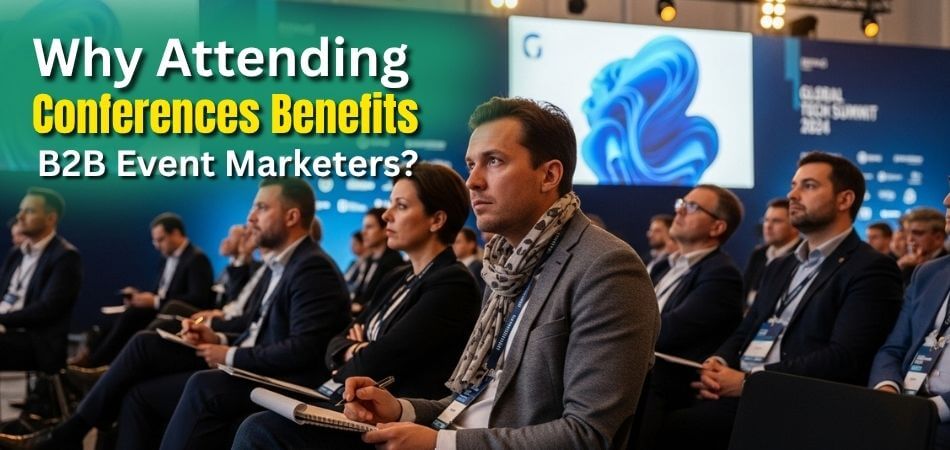Conferences are special events where people come together to share ideas and build connections. For B2B event marketers, they are a chance to grow their network, learn new trends, and build trust with others. These events also make it easier to meet leaders, find new partners, and get better leads for sales. On top of that, conferences bring fresh content ideas and help marketers stay ahead in their work.
If you’re still asking, why attending conferences benefits B2B event marketers, the specific answer is —
Attending conferences helps B2B event marketers by growing their network, learning new trends, and building trust with others. They can meet leaders, find partners, and get better leads for sales. Conferences also give fresh content ideas and help marketers stay ahead in their field.
In this article, we’ll look at these benefits in detail and show you how to make the most of your next event.
Why Attending Conferences Benefits B2B Event Marketers?
Conferences bring people together in ways that are exciting, fun, and full of learning. They create spaces where ideas can grow, connections can form, and opportunities can open. Marketers attending these events often return with fresh thoughts and stronger networks. Let’s look at how conferences help B2B event marketers succeed.
Networking and Mentorship
Conferences are one of the best places to meet people who understand the business world. You can talk directly with experienced leaders who share advice and guidance. Many of these conversations can lead to strong relationships that last long after the event ends. Meeting mentors and peers helps marketers grow both personally and professionally.
Industry Knowledge
Every conference is filled with sessions, talks, and panels that bring new knowledge. Marketers get a chance to learn about the latest trends, tools, and strategies. Staying updated helps them make smart decisions that keep their work fresh and effective. It also makes them more confident when planning new campaigns.
Brand Authority
Being part of a conference gives marketers a chance to be seen as experts. Whether they are speaking, hosting, or even just attending, their presence builds trust with others. This visibility makes their brand stronger in the eyes of industry peers. Over time, it sets them apart as reliable voices in the market.
Content Creation
Conferences are full of fresh ideas that can turn into useful content. Marketers can record talks, write about what they learned, or share stories from their experience. These pieces of content are valuable for blogs, videos, and social posts. They help keep the brand active and connected with the audience.
Leads and Sales
One of the strongest reasons to attend is the chance to meet decision-makers face-to-face. These personal conversations often build more trust than online messages. Marketers can form deeper relationships that lead to better-quality leads and stronger sales results. It’s a proven way to improve success in B2B marketing.
Partnerships
Conferences also open doors for partnerships that may not happen anywhere else. Marketers can find other businesses with similar goals and create ways to work together. These partnerships can turn into long-term collaborations that help both sides grow. They show how powerful connections can be when formed in person.
Staying Competitive
The business world changes quickly, and conferences help marketers keep up with new developments. By attending, they learn about the latest tools, ideas, and practices shaping the industry. For example, going to a digital marketing conference in Canada can bring insights that give a company an edge. Staying current means staying ahead of competitors.
How to Choose the Best Conferences for B2B Event Marketers?
Choosing the right conference can shape how much value you gain from attending. With so many events happening each year, it’s easy to feel unsure about which ones are really worth your time and budget. These steps will help you choose events that give the best results.
Set Goals
- Decide what you want from the event, like more leads or stronger brand trust. Clear goals make every choice simple.
- Use numbers to track results, such as leads gained or contacts made. This helps improve the next event.
Know the Audience
- Make sure the event attracts the right people, like potential clients and helpful business partners. Wrong crowds waste effort.
- Look at past attendees or event pages to confirm who joins. Social media also shows the type of people.
Check Event Quality
- See if the event has good speakers, useful workshops, and trusted topics. Strong content makes time well spent.
- Notice if rivals or partners attend the same event. Their presence means the event is worth the trip.
Budget and Place
- Count all costs, not just tickets. Travel, hotel, and food add up and affect your budget.
- Pick events in places that are easy to reach. Good locations draw stronger people and make trips smoother.
Extra Perks
- Some events let you speak or sponsor. These chances can grow your brand and make you more visible.
- Check if you can show products or talk one-to-one with leads. These talks often bring better sales results.
Timing
- Choose events that match product launches or campaigns. Right timing can double the impact of your work.
- Pick dates that fit your schedule. It avoids stress and lets you focus fully during the event.
What KPIs Measure Conference ROI for Event Marketing?
Conferences bring people together for learning, sharing, and growing business in exciting ways. They give marketers real chances to connect with others and test new ideas. Every event can be a turning point that changes future marketing plans. But to know if it worked, results must be tracked carefully. Here are the key KPIs to measure conference ROI.
Lead Quality
One of the clearest signs of success is the quality of new leads. It is not about how many names you collect but how many truly match your goals. Stronger leads often turn into better sales over time. This makes lead quality a key KPI for any event.
Sales Impact
Sales growth is a direct way to see if the event paid off. If deals were closed faster because of conference meetings, the impact is clear. It shows the event helped push conversations forward. Tracking sales from contacts made at the event gives exact proof.
Brand Awareness
Conferences also raise how many people notice and remember your brand. Speaking on stage, running a booth, or even networking can leave lasting impressions. Measuring mentions online or checking social media growth shows brand visibility. These numbers reveal how far your message reached.
Event Engagement
It is important to see how people interacted during the event. Did they attend your sessions, visit your booth, or ask questions? These actions show interest in your business. High engagement means the audience found value in what you offered.
Networking Value
Connections matter as much as sales. Building trust with peers, partners, and influencers adds long-term benefits. These relationships often bring future deals or joint projects. Counting meaningful conversations helps show the hidden value of conferences.
Cost Efficiency
Marketers must balance spending with results. Tracking costs like tickets, travel, and stays helps measure if the gains are worth it. For example, comparing the results against attending B2B conferences cost shows real efficiency. If the value outweighs the spend, then ROI is positive.
Content Benefits
Events are full of content opportunities for blogs, videos, or case studies. Measuring the amount of usable content created after a conference shows another return. These materials keep working long after the event ends. Content creation value is a powerful KPI.
Ways to Network Effectively at Industry Conferences
Conferences are lively spaces where people meet, share stories, and build stronger connections. They bring chances to learn, explore, and grow. Every conversation can open new doors that lead to future success. To make this happen, smart networking is important. Here is the way.
Prepare Early
Networking starts before the event even begins. Look at the speaker list and check who will attend. Making a plan helps you know whom to meet. Preparation gives confidence and saves time once you are there.
Join Sessions
Attending talks and workshops is a natural way to meet new people. Shared interests make conversations easier to start. After a session, it feels natural to discuss the topic with others nearby. This often leads to lasting connections.
Ask Questions
Good questions leave strong impressions. During sessions, asking clear and thoughtful questions shows interest and knowledge. People often remember someone who sparks a useful discussion. This simple step makes networking easier and more natural.
Use Breaks
Coffee breaks, lunches, and open times are perfect for meeting people casually. These relaxed moments make conversations smoother. A quick chat while waiting in line can turn into something meaningful. Small steps can lead to big results.
Be Genuine
People value honesty and friendly talk. Show real interest in others instead of only sharing about yourself. Listen carefully and respond thoughtfully to what they say. Genuine behavior helps build trust and stronger relationships.
Exchange Contacts
Sharing contact details is a key part of networking. Always carry business cards or be ready to connect online. Make sure to follow up later with a short, friendly message. Staying in touch keeps the connection alive.
Follow Up
After the conference, reach out to people you met. A quick message helps remind them of your talk. Following up keeps the relationship active beyond the event. Strong follow-ups often turn short meetings into long-term partnerships.
How to Repurpose Conference Content for Lead Generation?
Conferences are full of fresh ideas, inspiring talks, and meaningful conversations that do not end when the event does. Many of these moments can be turned into valuable tools for building business growth. Repurposing content is about making smart use of what you already have. With the right steps, conference insights can become powerful assets for lead generation.
Blog Articles
Keynotes and panel talks often share useful lessons. These lessons can be turned into clear, engaging blog posts. Blogs make it easy for readers to learn even if they missed the event. They also improve trust and draw more people to your website.
Social Media Posts
Short highlights from sessions can be shared as quick posts. Photos, quotes, or key takeaways work very well. Social platforms spread ideas fast and connect with a wide audience. Consistent posts keep your brand active and visible after the event.
Email Campaigns
Notes from a conference session can be used for email newsletters. Sharing insights keeps your audience informed and engaged. Adding useful tips gives readers reasons to click and explore more. Emails like these often bring stronger responses from leads.
Videos and Clips
Recordings from events can be cut into smaller video clips. These clips are perfect for social platforms or websites. Visual content is easier to watch and share with others. It creates more interest and helps capture attention quickly.
Guides and Ebooks
Detailed sessions can be turned into step-by-step guides or ebooks. These resources give deep insights that people value. Offering them in exchange for contact details helps collect quality leads. This approach works well for long-term content marketing.
Webinars
Using conference topics as a base, you can host online webinars. This lets you share insights with a larger group. Webinars also encourage direct interaction with potential leads. They build trust and highlight your expertise.
Marketing Strategy
Every repurposed piece should match business goals. For example, aligning content with the purpose of B2B marketing conference can make efforts more targeted. This ensures the material speaks to the right audience. A clear strategy always improves results from lead generation.
Budgeting Tips for Sending a B2B Marketing Team to Events
Sending a team to events can bring strong results, but planning costs wisely is important. A smart budget helps control spending and ensures resources are used effectively. These tips keep the process simple and make every dollar count.
Define Clear Goals
- A team needs to set goals before money is spent, because clear direction stops waste and creates stronger planning. Goals may include gaining new leads, improving knowledge, or raising brand trust, and each requires a different budget.
- Without clear goals, expenses increase fast and results stay weak, leaving the company with lost chances. Knowing goals first ensures the money goes into the right areas and creates measurable outcomes.
Plan Travel Early
- Booking flights and hotels in advance helps cut costs, because last-minute prices are often much higher. Early planning also gives your team better options for location, comfort, and staying close to the event.
- Travel budgets get easier when details are sorted weeks earlier, avoiding stress and saving hidden fees. Careful scheduling ensures team members spend less time worrying about logistics and more time focusing on event success.
Manage Registration Costs
- Registration fees take a large part of the event budget, so compare different ticket options carefully before paying. Discounts for early sign-ups or group passes often save money while keeping access to important sessions.
- Companies should evaluate if higher-priced passes actually add value, because not all extra features are worth the cost. Choosing wisely ensures resources are directed toward areas that truly help the team achieve its goals.
Control Daily Spending
- Meals, local travel, and small extras often add up quickly, so set daily spending limits for each person. Clear limits help avoid unnecessary costs and keep team members mindful of the budget during the event.
- Using prepaid cards or daily allowances creates accountability, since team members track expenses more closely. This method avoids confusion later and simplifies the reporting process when the trip is over.
Balance Team Size
- Sending too many people raises costs without giving equal returns, so choose the right mix of roles. Every team member should bring value by learning, networking, or sharing insights with others after the event.
- Smaller groups often save money while still covering important sessions and contacts. Careful selection ensures a balance between learning opportunities and staying within financial limits.
Track All Expenses
- Keeping records during the trip helps avoid mistakes and missed costs that confuse reporting later. Tracking tools or apps make this easy, letting companies monitor how money gets used in real time.
- When all expenses are tracked, future budgets get better because companies see where spending was too high. Accurate tracking also creates transparency and builds trust within the team and organization.
Evaluate ROI
- After the event, review results against costs to see if the money created enough value for the company. This includes new leads, knowledge gained, and stronger partnerships that may turn into future sales.
- If the return feels weak, adjust future plans to avoid repeating mistakes and wasting resources again. Careful evaluation ensures each event continues to improve in both financial efficiency and business impact.
FAQs About B2B Event Marketers Benefit from Conferences
Conferences give B2B marketers more than just presentations and booths. They offer new chances, fresh learning, and useful growth. Below are answers to common questions about how attending conferences supports business goals and long-term marketing success.
How Do Conferences Inspire Creativity For Marketers?
Conferences bring together new ideas, stories, and practical examples from experts. These experiences help marketers think differently and create fresh campaigns. Creativity often comes from listening to others, exploring unique strategies, and turning event lessons into actionable marketing ideas.
Can Conferences Improve Team Morale And Motivation?
Yes, events often boost energy and motivation within a marketing team. Attending together builds stronger bonds, encourages group learning, and adds shared excitement. This positive impact motivates team members to apply what they learned and work more effectively afterward.
Do Conferences Help With Long-Term Business Growth?
Conferences give marketers more than immediate leads. They create opportunities for lasting connections, stronger industry recognition, and future collaborations. These long-term effects support steady growth, helping businesses remain strong, competitive, and ready to meet changing market needs over time.
How Do Conferences Support Product Launches?
Events are great platforms for showing new products to an audience of decision-makers. Marketers can explain features, answer questions, and gain feedback quickly. This direct interaction makes launches more impactful and builds stronger trust in the product’s value.
Can Conferences Strengthen Customer Relationships?
Yes, attending conferences lets marketers meet existing customers face-to-face. Personal interaction builds trust, clears doubts, and strengthens bonds. Customers appreciate direct engagement, and this effort often leads to stronger loyalty, repeat sales, and a more positive view of the brand.
How Do Conferences Benefit Market Research?
Conferences offer marketers real-time insights into industry trends and customer behavior. By observing sessions, conversations, and competitor actions, they collect useful data. These findings shape better strategies, guiding future campaigns and ensuring decisions stay aligned with current market needs.
Do Conferences Offer Learning Beyond Sessions?
Absolutely, much learning happens outside official sessions. Hallway conversations, casual meetups, and small group discussions often share practical tips. These informal exchanges provide real-world insights and experiences that marketers can apply directly to improve their own work strategies.
How Do Conferences Build Industry Reputation?
By actively joining events, marketers show commitment to staying informed and engaged. Speaking, hosting, or even consistent attendance helps others see them as credible professionals. Over time, this steady involvement builds a strong, respected reputation in the industry community.
Last Words
Conferences give B2B marketers more than a place to sit and listen. They create chances to meet people, share ideas, and find new partners. These events also bring fresh content and help marketers improve their work.
The real benefit comes when we see why attending conferences benefits B2B event marketers in so many ways. They build trust, bring better leads, and keep businesses strong in a changing market. With clear goals, smart budgets, and content reuse, the value of each event continues. Conferences remain an important step for long-term growth and lasting success.








